The Los Angeles Times reports that in a bid to shift cultural conversations around AI, Google has launched “AI on Screen,” an initiative to fund short films that explore the intersection of humanity and technology. The tech giant is partnering with Santa Monica-based Range Media Partners to produce the films, which aim to present a friendly perspective on AI compared to the dystopian movies like Terminator that have long dominated Hollywood.
Two short films have already been greenlit through the project. Sweetwater, directed by Michael Keaton and written by his son Sean Douglas, tells the story of a man who discovers a hologram of his deceased celebrity mother when visiting his childhood home. The other film, Lucid, follows a couple who risk everything on a device that allows them to share the same dream in an effort to escape their suffocating reality.
Google’s effort comes at a time when Americans have mixed feelings about AI. A 2024 survey from Bentley University and Gallup revealed that 56 percent of Americans believe AI does “equal amounts of harm and good,” while 31 percent think it does “more harm than good.” By funding propaganda that makes AI seem useful and friendly to humans, Google hopes to shift these perceptions.
The tech giant has much riding on convincing consumers that AI can be a positive force, as the space becomes increasingly crowded with competitors such as OpenAI, Anthropic, Apple, and Meta. The company claims shorts are not commercials for AI, instead they aim to explore the coexistence of humans and technology, presenting a more balanced perspective compared to the predominantly dystopian narratives in films.
Creators working with Google are given access to tech experts who can provide insight into the real-world workings of the technology featured in their scripts. The initiative does not have a set target for the number of films it will fund, but some of the shorts could potentially become full-length features.
The controversial topic of AI has played a significant role in recent Hollywood strikes, with actors and writers expressing concerns about their likenesses and work being replicated or manipulated without permission or payment. As AI companies seek to improve public perceptions of the technology, they are finding creative ways to make it more approachable, such as sponsoring museum exhibits and partnering with film studios.
Despite these efforts, Hollywood continues to produce stories about the dangers of AI, with recent examples including Blumhouse’s M3GAN and Afraid. As Google and others try to put a softer focus on the technology, it remains to be seen whether public perceptions will shift, or if dystopian tales will continue to dominate the cultural narrative around AI.
Read more at the Los Angeles Times here.
Lucas Nolan is a reporter for Breitbart News covering issues of free speech and online censorship.
Breitbart News
Read the full article .


